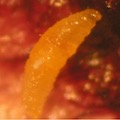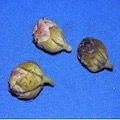Rose of Sharon
Contact
Plant Diagnostician
Phone: (479) 575-2727
Email: ssmith@uada.edu
Jason Pavel
Diagnostician
Phone: (479) 575-7257
Email: jpavel@uada.edu
University of Arkansas System Division of Agriculture
Cralley Warren Building
Room 16
2601 N. Young Ave.
Fayetteville, AR 72704
Rose of Sharon Blossom Midge Larva
Plant Health Clinic Disease Note Issue 34
Sherrie Smith and Jason Pavel

Rose of Sharon Blossom Midge Larva-Contarinia maculipennis
Photo by Sherrie Smith, University of Arkansas System Division of Agriculture
Rose of Sharon shrubs are one of our most reliable landscape and garden plants. They have few serious diseases and provide a long season of bloom. Occasionally, however, the clinic receives samples with the complaint of buds refusing to open. Newly planted Rose Of Sharon may drop their buds for several years while establishing roots. Aphid feeding on the buds can also prevent opening. We sometimes find the culprit to be blossom midges, Contarinia maculipennis.
What are the symptoms of blossom midges feeding on flower buds?
Midges are tiny members of the fly family. Midge maggots feed inside unopened flower buds, causing deformed, discolored buds and blossoms, and premature bud or blossom drop. Heavily infested buds may have several dozen maggots feeding at a time. The adult female deposits masses of white to cream colored eggs into the open tips of flower buds. The microscopic eggs hatch within 24 hours into maggots that move into the bud. Newly hatched maggots are white but turn yellow as they feed. After 5-7 days they leave the buds and pupate in the soil. Gnat sized adults that resemble very tiny mosquitoes emerge in 14- 21 days to breed and begin the cycle again.
How do I prevent midges in Rose of Sharon?

Rose of Sharon Blossom Midge Damage-Contarinia maculipennis
Photo by Sherrie Smith, University of Arkansas System Division of Agriculture
Midges are difficult to control as they spend most of their life cycle protected inside the flower buds. Sanitation is critical. Clean up all fallen and unopened buds on the plant. Dispose of these infected buds off the property. Use Bio Advanced Power Force Multiinsect Killer. This is a granular blend that should be applied in the spring when the bushes begin to leaf. The second product from Bio is Bio Advanced Garden Rose & Flower Insect Killer. This is applied as a spray. If you have an infestation of midge, multiple applications will be required every 10 days. Also, be aware that Rose of Sharon grows and flowers best with regular fertilization. Submit soil for soil test to check pH and nutrients.
Take Aways:
- Clean up all fallen and unopened flower buds.
- Use a systemic insecticide in the spring.
- Multiple applications may be required
Follow us on Facebook!
This work is supported by the Crop Protection and Pest Management Program [grant no. 2017-70006- 27279/project accession no. 1013890] from the USDA National Institute of Food and Agriculture.